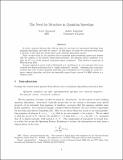The need for structure in quantum speedups
Author(s)
Aaronson, Scott; Ambainis, Andris
DownloadAaronson_The Need for Structure.pdf (297.7Kb)
OPEN_ACCESS_POLICY
Open Access Policy
Creative Commons Attribution-Noncommercial-Share Alike
Terms of use
Metadata
Show full item recordAbstract
Is there a general theorem that tells us when we can hope for exponential speedups from quantum algorithms, and when we cannot? In this paper, we make two advances toward such a theorem, in the black-box model where most quantum algorithms operate.
First, we show that for any problem that is invariant under permuting inputs and outputs (like the collision or the element distinctness problems), the quantum query complexity is at least the 9th root of the classical randomized query complexity. This resolves a conjecture of Watrous from 2002.
Second, inspired by recent work of O'Donnell et al. and Dinur et al., we conjecture that every bounded low-degree polynomial has a "highly influential" variable. Assuming this conjecture, we show that every T-query quantum algorithm can be simulated on most inputs by a poly(T)-query classical algorithm, and that one essentially cannot hope to prove P!=BQP relative to a random oracle.
Date issued
2009-01Department
Massachusetts Institute of Technology. Computer Science and Artificial Intelligence LaboratoryJournal
Electronic Colloquium on Computational Complexity
Publisher
Electronic Colloquium on Computational Complexity
Citation
Aaronson, Scott and Andris Ambainis. "The need for structure in quantum speedups." Electronic Colloquium on Computational Complexity, Report No. 110 (2009).
Version: Author's final manuscript
ISSN
1433-8092